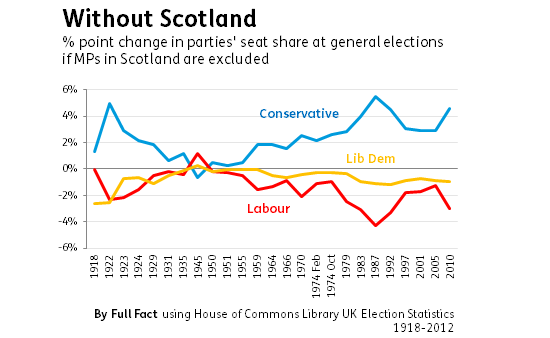Claims of 'permanent Conservative rule' after Scottish independence don't stand up to history
It's common to hear claims like this about the effect of Scottish independence on future UK elections. The argument goes that since Scotland has predominantly Labour MPs, then without Scotland the UK would have a permanent Conservative majority in the House of Commons.
This reasoning doesn't stand up to past experience. Since 1918, only four UK general election outcomes would have been affected had Scottish MPs been taken out of the equation.
| Election | Winner | Winner (no Scotland) |
| 1918 | CON | CON |
| 1922 | CON | CON |
| 1923 | Hung — CON largest | Hung — CON largest |
| 1924 | CON | CON |
| 1929 | Hung — LAB largest | Hung — LAB largest |
| 1931 | CON | CON |
| 1935 | CON | CON |
| 1945 | LAB | LAB |
| 1950 | LAB | LAB |
| 1951 | CON | CON |
| 1955 | CON | CON |
| 1959 | CON | CON |
| 1964 | LAB | Hung — CON largest |
| 1966 | LAB | LAB |
| 1970 | CON | CON |
| 1974 Feb | Hung — LAB largest | Hung — CON largest |
| 1974 Oct | LAB | Hung — LAB largest |
| 1979 | CON | CON |
| 1983 | CON | CON |
| 1987 | CON | CON |
| 1992 | CON | CON |
| 1997 | LAB | LAB |
| 2001 | LAB | LAB |
| 2005 | LAB | LAB |
| 2010 | Hung — CON largest | CON |
In 1964 Labour won a slim majority; without Scottish MPs it would have been a hung parliament with the Conservatives as the largest party. In the October 1974 election (the second that year), Labour again secured a wafer-thin majority, but without Scotland it would have fallen short with the Conservatives as the largest party. Most recently, in 2010 the Conservative party would have had a majority if Scotland were taken out; in reality of course it fell short.
That's not to say it wouldn't be more difficult for Labour: a majority of Scottish MPs have been Labour at every election since 1955, and Labour remains dominant by historical standards. Hence the 'advantage' to the Conservatives in Scotland's absence is getting bigger:
Another reason to doubt the prospect of 'permanent' Conservative governments is the possibility that people's voting patters will change. Parties in power often slip in opinion polls after winning an election - in fact a poll 'slump' of some sort is observable after every recent election. While some do increase their ratings again towards the end of their term and secure re-election, this won't always be the case.
It's also open to question whether social attitudes would shift in a new political landscape, although it's harder still to measure what effect the party in power has had on attitudes historically. In addition, it's impossible to predict how parties may alter their platforms in response to changing attitudes.
Correction (19 September 2014)
The original article stated February 1974 without MPs from Scotland would have been a hung parliament with Labour as the largest party. This should have said a hung parliament with the Conservatives as the largest party, so a fourth election with a different outcome. Sorry for the error and we've corrected the piece to account for this.
